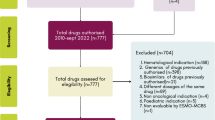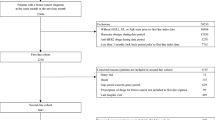Abstract
Background
Companion diagnostics permit the selection of patients likely to respond to targeted anticancer drugs; however, it is unclear if the drug development process differs between drugs developed with or without companion diagnostics. Identification of differences in study design could help future clinical development.
Patients and Methods
Anticancer drugs approved for use in solid tumors between 28 September 2000 and 4 January 2014 were identified using a search of the US FDA website. Phase III trials supporting registration were extracted from the drug label. Each published study was reviewed to obtain information about the phase I and II trials used for the development of the respective drug.
Results
We identified 35 drugs and 59 phase III randomized trials supporting regulatory approval. Fifty-three phase I trials and 47 phase II trials were cited in the studies and were used to support the design of these phase III trials. The approval of drugs using a companion diagnostic has increased over time (p for trend 0.01). Expansion cohorts were more frequently observed with drugs developed with a companion diagnostic (62 vs. 20%; p = 0.005). No differences between drugs developed with or without a companion diagnostic were observed for the design of phase I and II studies.
Conclusions
The approval of drugs developed with a companion diagnostic has increased over time. The availability of a companion diagnostic was associated with more frequent use of phase I expansion cohorts comprising patients selected by the companion diagnostic.


Similar content being viewed by others
References
Hanahan D, Weinberg RA. Hallmarks of cancer: the next generation. Cell. 2011;144:646–74.
Bedard PL, Hansen AR, Ratain MJ, Siu LL. Tumour heterogeneity in the clinic. Nature. 2013;501:355–64.
Amir E, Seruga B, Martinez-Lopez J, et al. Oncogenic targets, magnitude of benefit, and market pricing of antineoplastic drugs. J Clin Oncol. 2011;29:2543–9.
Tran B, Brown AM, Bedard PL, et al. Feasibility of real time next generation sequencing of cancer genes linked to drug response: results from a clinical trial. Int J Cancer. 2013;132:1547–55.
Vogelstein B, Papadopoulos N, Velculescu VE, et al. Cancer genome landscapes. Science. 2013;339:1546–58.
Tran B, Dancey JE, Kamel-Reid S, et al. Cancer genomics: technology, discovery, and translation. J Clin Oncol. 2012;30:647–60.
Shaw AT, Kim DW, Nakagawa K, et al. Crizotinib versus chemotherapy in advanced ALK-positive lung cancer. N Engl J Med. 2013;368:2385–94.
Mansfield EA. FDA perspective on companion diagnostics: an evolving paradigm. Clin Cancer Res. 2014;20:1453–7.
Ocana A, Amir E, Yeung C, et al. How valid are claims for synergy in published clinical studies? Ann Oncol. 2012;23:2161–6.
Ocana A, Pandiella A, Siu LL, Tannock IF. Preclinical development of molecular-targeted agents for cancer. Nat Rev Clin Oncol. 2010;8:200–9.
US FDA. Hematology/oncology (cancer) approvals and safety notifications. http://www.fda.gov/drugs/informationondrugs/approveddrugs/ucm279174.htm. Accessed 1 Jan 2014.
CenterWatch. 2017 FDA approved drugs. http://www.centerwatch.com/drug-information/fda-approved-drugs/year/. Accessed 1 Jan 2014.
Drugs@FDA: FDA approved drug products. http://www.accessdata.fda.gov/scripts/cder/drugsatfda/index.cfm?fuseaction=Search.Addlsearch_drug_name. Accessed 1 Jan 2014.
Parkinson DR, McCormack RT, Keating SM, et al. Evidence of clinical utility: an unmet need in molecular diagnostics for patients with cancer. Clin Cancer Res. 2014;20:1428–44.
Willyard C. ‘Basket studies’ will hold intricate data for cancer drug approvals. Nat Med. 2013;19:655.
Jorgensen JT. Clinical application of companion diagnostics. Trends Mol Med. 2015;21:405–7.
Manji A, Brana I, Amir E, et al. Evolution of clinical trial design in early drug development: systematic review of expansion cohort use in single-agent phase I cancer trials. J Clin Oncol. 2013;31:4260–7.
Powles T, Eder JP, Fine GD, et al. MPDL3280A (anti-PD-L1) treatment leads to clinical activity in metastatic bladder cancer. Nature. 2014;515:558–62.
European Organisation for Research and Treatment of Cancer—EORTC. CREATE: cross-tumoral phase 2 with crizotinib (CREATE). ClinicalTrials.gov. https://clinicaltrials.gov/ct2/show/NCT01524926. Accessed 1 Jan 2014.
Acknowledgements
Asociación ACEPAIN for their support in cancer research.
Author information
Authors and Affiliations
Corresponding author
Ethics declarations
Conflict of interest
Ariadna Tibau, Laura Díez-González, Beatriz Navarro, Eva M. Galán-Moya, Arnoud J. Templeton, Bostjan Seruga, Atanasio Pandiella, Eitan Amir, and Alberto Ocana have no conflicts of interest to declare.
Funding
Instituto de Salud Carlos III (PI16/01121), ACEPAIN; Diputación de Albacete and CRIS Cancer Foundation (to AO); Beca Ampliación de Estudios (BAE) to AO for his stay at Yale University; Ministry of Economy and Competitiveness of Spain (BFU2012–39151 and BFU2015-71371-R), the Instituto de Salud Carlos III through the Spanish Cancer Centers Network Program (RD12/0036/0003) and the CIBERONC, the scientific foundation of the Asociación Española Contra el Cáncer (AECC) and the CRIS Foundation (to AP). The work carried out in the Spanish laboratories receives support from the European Community through the regional development funding program (FEDER).
Electronic supplementary material
Below is the link to the electronic supplementary material.
Rights and permissions
About this article
Cite this article
Tibau, A., Díez-González, L., Navarro, B. et al. Impact of Availability of Companion Diagnostics on the Clinical Development of Anticancer Drugs. Mol Diagn Ther 21, 337–343 (2017). https://doi.org/10.1007/s40291-017-0267-y
Published:
Issue Date:
DOI: https://doi.org/10.1007/s40291-017-0267-y




